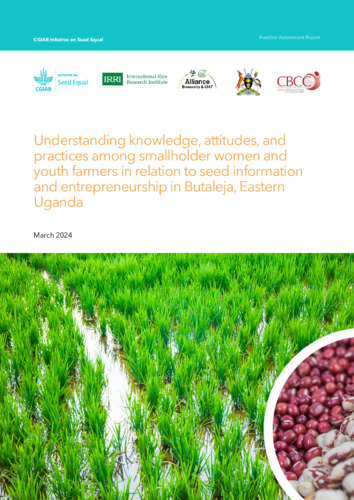Understanding knowledge, attitudes, and practices among smallholder women and youth farmers in relation to seed information and entrepreneurship in Butaleja Eastern Uganda
March 2024 | Baseline Assessment Report 1
1.
Introduction
1.1 Background
The agricultural sector is still the main livelihood for the majority of the Ugandan populace. According to the main development blueprint for the country, Uganda’s Vision 2040, agriculture is expected to play a critical role in transforming the economy from a predominantly peasant and low-income country to a competitive upper-middle-income country by 2040. Agriculture is envisaged to significantly contribute to the gross domestic product and is a crucial source of employment and income. Uganda’s agricultural sector generates roughly one-quarter of the GDP, employs 70% of the labor force, and accounts for about half of the national land area (UBOS 2016)1.
The farming system in Uganda is dominated by smallholder producers owning an average of less than 2 acres of farmland, accounting for 90% of the total farming community (Background Note: Uganda, 20152). Uganda has relatively good agro-climatic conditions with bi-modal rainfall patterns in most parts of the country, and its land and water resources are amongst the best in Africa (CCAFS 2017)3. However, agricultural production in Uganda operates at less than 40% of its attainable potential for key staple crops (Kraybill et al., 2012). Adopting modern agricultural technologies can increase yields, and access to quality inputs is still a challenge, leaving farmers vulnerable to adverse weather conditions (IGC, 2017)4.
The CGIAR’s Seed Equal Work Package 6, led by IRRI, seeks to address the challenge of equitable seed access. It supports the delivery of seeds of improved, climate-resilient, market-preferred, and nutritious varieties of priority crops. It aims to provide a high rate of genetic gain to farmers while also ensuring equitable access by women and other disadvantaged groups. IRRI has partnered with CBCC to design and implement a project to address the challenges of equitable access to climate-resilient, market-preferred, and nutritious varieties of beans and rice in Eastern Uganda. The project aims to customize a strategy and equitable seeds access intervention model for Uganda.

